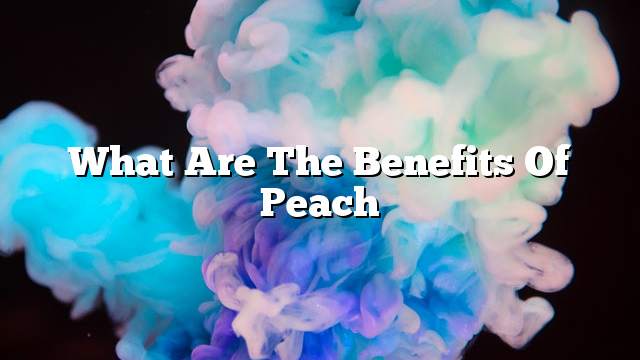Peaches
Peach is a flowering plant that follows the pink family. It was known in ancient times as Persian apples. It dates back to the northeast of China, where it was known as a symbol of longevity. In 1600, Spanish missionaries planted peach trees in America. Peaches became staple food in temperate regions. The peach is a part of the single-core fruit family. It contains a single seed surrounded by a fossilized casing such as apricots, cherries, plums and nectarine. The color of the pulp varies from white to yellow to orange, Adherent of a pulp, or be separated from him. Peach is rich in potassium. It contains a large amount of potassium that is close to that of other fruits such as bananas, melons, kiwi, Mango, orange, and pear, and contains several vitamins and minerals, including vitamin A, vitamin C, beta-carotene, and contains a good proportion of fiber.
Benefits of peaches
Several scientific research at the University of Texas has shown that single-core fruits, such as peaches, contain bioactive compounds, have anti-obesity and anti-inflammatory properties, and may also reduce LDL-related cholesterol, Published in 2017 that eating peach helps the body of smokers to get rid of nicotine effectively, thanks to the many benefits of peach and fruit-one-core in general to the existence of four major phenol groups, namely: Anthocyanin thocyanins, chlorogenic acids, quercetins and catechins, all of which work together to fight obesity, obesity, and other health problems.
Benefits of peaches for the skin
High intake of fruits and vegetables is associated with healthy skin and hair, increased energy, low weight and low risk of death. Vitamin C is an antioxidant that helps reduce wrinkles, improves skin texture, and helps fight skin damage. Sun and pollution, and plays this vitamin specifically played a vital role in the formation of collagen that supports the skin.
Peach benefits for heart health
Peaches contain fiber, potassium, vitamin C and choline, all of which contribute to heart health, and because the increase in the intake of potassium sources while reducing sources containing sodium is the change required in the diet to reduce the risk of heart disease And blood vessels, a study found that those who get 4069 mg of potassium are less likely to have death from ischemia than those who get less than 1000 mg of potassium a day.
Peach benefits for eye health
The consumption of more fruit, ie, more than 3 servings per day, has shown a good effect in reducing the risk of development of macular degeneration in the eye, which is associated with aging.
Benefits of peaches for diabetes
Studies have shown that type 1 diabetics who consume foods rich in fiber, such as peaches, have lower blood sugar levels. For diabetics, they have improved glycemic, lipid, and insulin levels in the blood. -25 grams of fiber per day for women, and at 30-38 grams per day for men.
Benefits of peach cancer
A study from the University of Texas showed that plums and plum extracts were effective in killing the most aggressive types of breast cancer cells, as well as not causing damage to normal healthy cells. The study also showed that increased access to fiber of all types of fruits and vegetables is associated with a lower risk of colon cancer Because peach is an excellent source of powerful antioxidants such as vitamin C, peaches can also help fight the formation of free radicals associated with cancer, but because vitamin C is necessary and very useful as an antioxidant for cancer patients, quantification For therapeutic purposes beyond what can be taken orally only.
Nutritional value
The fruit of the peach, weighing 147 grams, contains 50 calories. The distribution of the nutrients will be shown in the following table:
The fruit of the peach provides the human body with 6% of its daily needs of vitamin A, 15% of its daily needs of vitamin C and more than 2% of the body’s needs of vitamin E, vitamin K, niacin, , Folate, as well as several minerals such as iron, choline, potassium, magnesium, phosphorus, manganese, zinc and copper.
